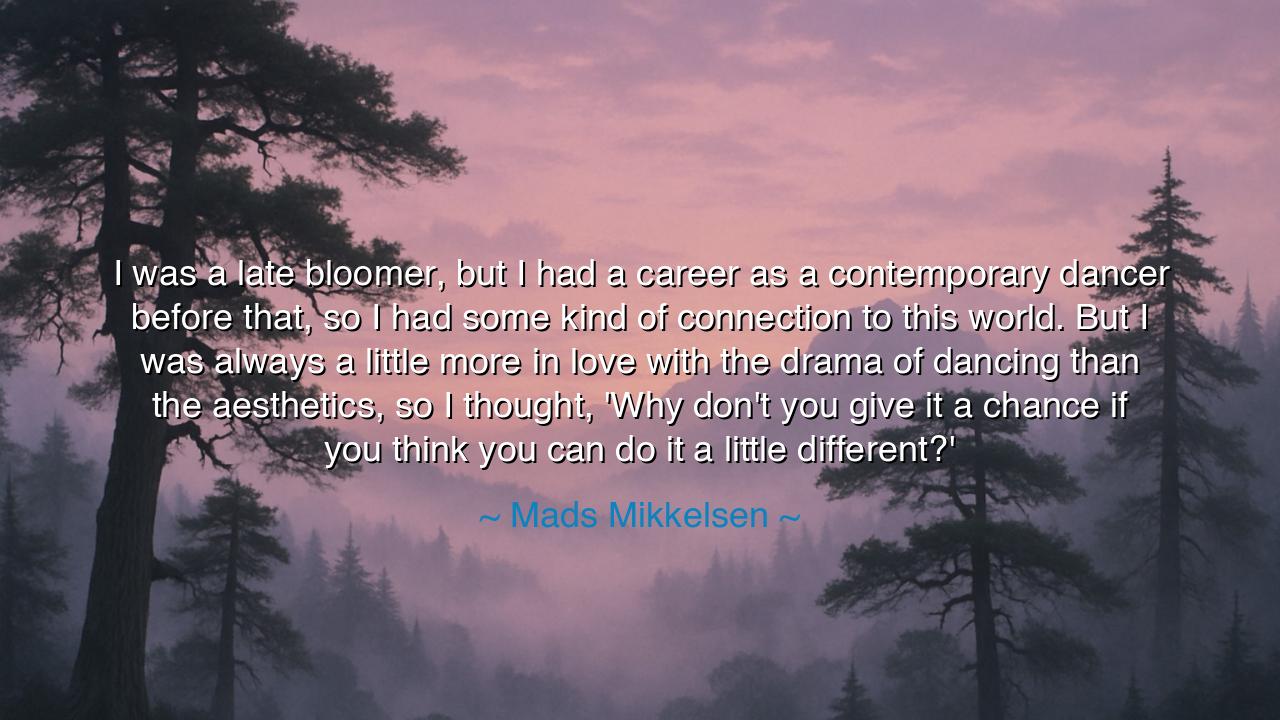
I was a late bloomer, but I had a career as a contemporary dancer
I was a late bloomer, but I had a career as a contemporary dancer before that, so I had some kind of connection to this world. But I was always a little more in love with the drama of dancing than the aesthetics, so I thought, 'Why don't you give it a chance if you think you can do it a little different?'






"I was a late bloomer, but I had a career as a contemporary dancer before that, so I had some kind of connection to this world. But I was always a little more in love with the drama of dancing than the aesthetics, so I thought, 'Why don't you give it a chance if you think you can do it a little different?'" These words from Mads Mikkelsen offer a glimpse into the nature of self-discovery and the courage it takes to embrace change. Mikkelsen speaks of being a "late bloomer," not in the sense of being behind in life, but in the sense of finding his true calling later than others might expect. His journey from contemporary dance to acting reveals a profound truth about the pursuit of passion and the flexibility required to move between worlds, embracing the drama of life with fearlessness and creativity.
In ancient times, heroes were often not born into greatness, but instead, were forged by their journeys—they began as ordinary figures, sometimes flawed, sometimes unrefined, but ultimately transcended their initial states through struggle and self-discovery. Hercules, for example, was a demi-god whose strength was not immediately understood by those around him. Only through the Twelve Labors did he prove his true worth. Mikkelsen’s transformation from dancer to actor mirrors this idea: greatness does not always appear in the form we first expect, and sometimes the path to destiny requires us to shift directions, to embrace the unknown even when it seems to be a step away from our initial passion.
This notion of self-discovery through reinvention is reflected in the lives of many who found their true calling later in life. Colonel Sanders, for example, was not always the symbol of fried chicken. He had several careers before founding KFC at the age of 62. His story, like Mikkelsen’s, teaches us that the timing of success matters less than the willingness to evolve. Sanders didn’t give up on the idea of success when his first ventures faltered. Instead, he adapted, like a dancer adjusting to the rhythm of a new performance, until he found a path that truly suited his abilities.
Mikkelsen’s love for the drama of dancing, as opposed to its aesthetics, reveals a deeper understanding of what it means to live authentically. He was not drawn to dance for its superficial beauty, but for its emotional expression—its storytelling. This mirrors the way many of the great artists and philosophers of history approached their crafts. Plato, for instance, wrote not merely for the sake of writing, but to engage with the deepest truths of existence. His work, like Mikkelsen’s approach to dance, was driven by a love of the meaning behind the action, not the surface-level form. Plato sought the drama of life’s questions, just as Mikkelsen sought the drama in dance, and later in his acting career.
The lesson in Mikkelsen’s journey is one of courage—the courage to step away from the familiar and into the unknown. It is a reminder that passion often leads us in unexpected directions, but those directions, though unfamiliar, may be the ones that offer the greatest opportunity for growth. Like Mikkelsen, we must be willing to question our limits and ask ourselves, "Why not try something different?" This openness to reinvention, to changing course when we feel the pull of something greater, is a courageous act of self-discovery.
In our own lives, we may encounter moments when we are drawn to something new, when we feel a pull to shift our focus, just as Mikkelsen did from dance to acting. The lesson is not to fear this shift, but to embrace it—to give ourselves the chance to explore unfamiliar paths. The willingness to adapt, to explore new realms of creativity or thought, is the hallmark of growth. It is in these moments of transition that we find our true potential—not in remaining fixed to the past, but in the brave exploration of the future.
Thus, the lesson from Mads Mikkelsen’s words is clear: do not let fear of the unknown or the unfamiliar stop you from pursuing the greatness that is waiting just beyond your comfort zone. Like a dancer embracing a new role on stage, or a philosopher exploring new realms of thought, we too must embrace the ever-changing rhythms of life with courage and curiosity. For it is in these moments of reinvention that we discover our truest selves, and our most profound accomplishments.






AAdministratorAdministrator
Welcome, honored guests. Please leave a comment, we will respond soon